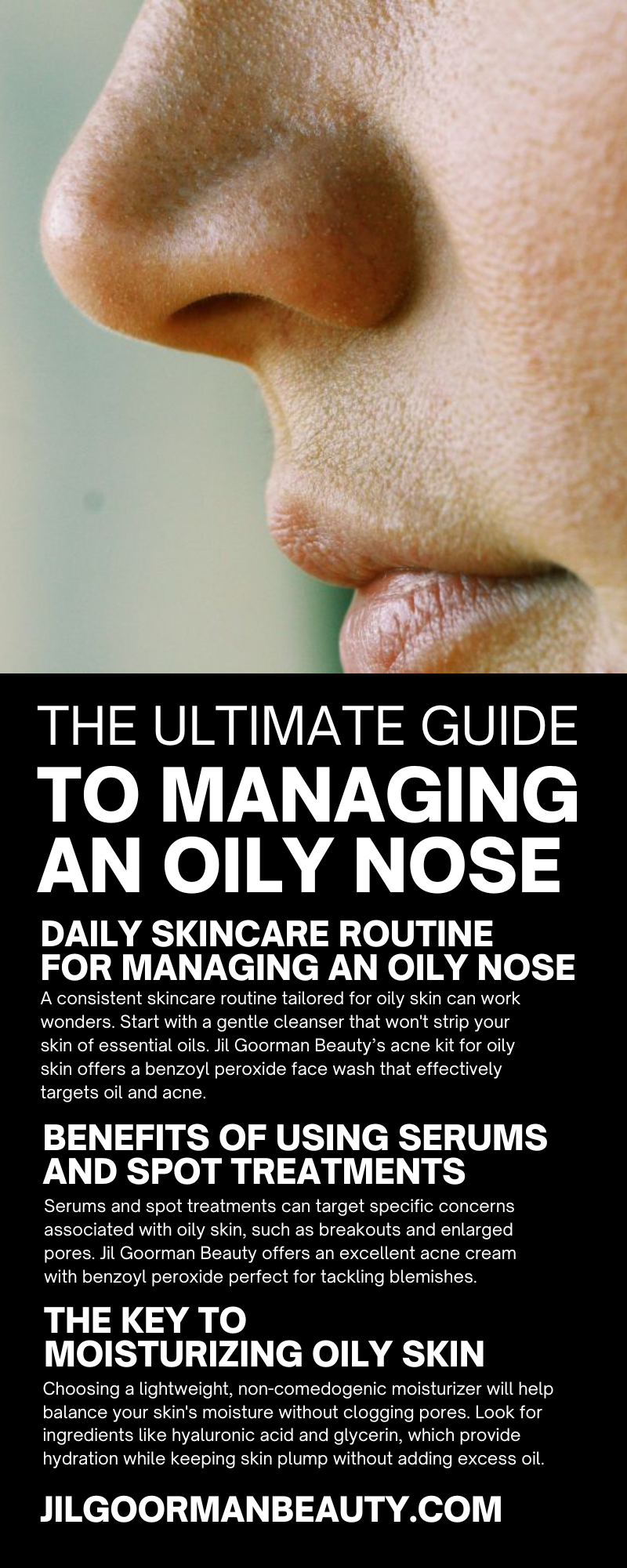If you've been battling the constant shine on your nose, you're not alone. Many people struggle with oily skin, especially around the nose area. This ultimate guide to managing an oily nose will teach you the best techniques and products to fight oil and keep your skin healthy and vibrant.
Why Does My Nose Get Oily?
Oily skin is the result of an overproduction of sebum by the sebaceous glands. While sebum helps protect and moisturize the skin, too much can lead to that unwanted shine.
Your nose is especially prone to oiliness because it has more sebaceous glands than other areas of your face. Genetics, hormones, or even stress are all factors that can increase oil production. While we can't change our DNA, we can certainly manage how our skin reacts.
Regularly observing your skin's behavior can help you identify patterns or triggers and knowing what makes your nose oily can empower you to make informed skincare choices.
The Role of Genetics and Hormones
Genetics play a significant role in determining your skin type. If oily skin runs in your family, you might be more prone to it, too. Hormones, particularly during puberty or menstrual cycles, can also spike oil production since they stimulate the sebaceous glands, leading to increased sebum.
Environmental Factors Affecting Oily Skin
External factors, such as humidity, pollution, and diet, can worsen oily skin. Humid climates can make your skin produce more oil, while pollution can clog pores, leading to breakouts.
A balanced diet can play a role in managing oily skin. Foods high in sugar and refined carbohydrates can trigger insulin spikes, leading to excess oil production. Being mindful of your environment and diet can help in controlling oiliness.
Daily Skincare Routine for Managing an Oily Nose
A consistent skincare routine tailored for oily skin can work wonders. Start with a gentle cleanser that won't strip your skin of essential oils. Jil Goorman Beauty’s acne kit for oily skin offers a benzoyl peroxide face wash that effectively targets oil and acne.
Follow up with an oily skin toner to balance pH levels. Toning helps remove any leftover impurities and prepares your skin for moisturization while tightening pores to reduce the appearance of oiliness.
Finally, moisturizing is crucial. Jil Goorman Beauty’s moisturizer contains hyaluronic acid and aloe to provide ample hydration without clogging pores while balancing moisture levels and reducing shine.
The Importance of Exfoliation
Exfoliating is essential for oily skin, as it removes dead skin cells and prevents clogged pores. Over-exfoliating can irritate the skin, so finding balance is key.
Our exfoliating cream contains five percent mandelic acid and niacinamide, which helps control oil while gently exfoliating. Use it twice a week for optimal results.
Proper exfoliation can also improve skin texture, making it smooth and radiant, but you must follow exfoliation with a calming moisturizer to nourish the skin.
Benefits of Using Serums and Spot Treatments
Serums and spot treatments can target specific concerns associated with oily skin, such as breakouts and enlarged pores. Jil Goorman Beauty offers an excellent acne cream with benzoyl peroxide perfect for tackling blemishes.
Apply a thin layer to affected areas after cleansing and toning. Benzoyl peroxide reduces inflammation and kills acne-causing bacteria, promoting clearer skin and using serums that contain niacinamide or hyaluronic acid can further enhance your skincare routine.
The Key to Moisturizing Oily Skin
Skipping moisturizers might seem like a solution to reduce oiliness, but it can actually lead to increased sebum production as your skin attempts to compensate for the lack of hydration.
Choosing a lightweight, non-comedogenic moisturizer will help balance your skin's moisture without clogging pores. Look for ingredients like hyaluronic acid and glycerin, which provide hydration while keeping skin plump without adding excess oil.
An oil-free gel moisturizer can benefit oily skin by offering necessary moisture and maintaining a matte finish throughout the day. Moisturized skin is healthy skin. By keeping your skin properly hydrated, you can effectively manage oiliness and achieve a more balanced complexion.
Choosing the Right Makeup for Oily Skin
Opt for oil-free and non-comedogenic makeup products to prevent clogged pores and use primer to create a smooth base and control shine throughout the day. Setting powder absorbs excess oil and keeps your makeup in place, plus regularly blotting with oil-absorbing sheets can keep shine at bay. Remember to remove makeup thoroughly at the end of the day since sleeping with makeup on can clog pores and exacerbate oiliness.
Diet and Lifestyle Tips for Managing Oily Skin
Eating a balanced diet rich in fruits, vegetables, and lean proteins can support healthy skin and staying hydrated helps regulate oil production. Exercise can also benefit your skin by improving circulation and promoting detoxification, but always shower and cleanse your face after workouts to remove sweat and impurities. Managing stress through meditation or relaxation techniques can also reduce oiliness as stressful situations can trigger hormonal changes that increase sebum production.
How Often Should You Cleanse Your Face?
Cleansing twice a day is generally recommended because over-cleansing can strip the skin of essential oils, prompting it to produce more oil, while infrequent cleansing results in sebum buildup and clogged pores. Incorporating a gentle cleanser can effectively remove dirt and excess oil without irritation. For those with extremely oily skin, a mid-day cleanse might be beneficial. Always follow cleansing with toner and moisturizer to maintain your skin's natural balance, so your skin remains healthy and hydrated.
Understanding the Role of Natural Oils
While it may seem counterintuitive, some natural oils can help balance oily skin. Jojoba or argan oil can regulate sebum production by mimicking your skin's natural sebum, signaling to the sebaceous glands to produce less oil.
Using these oils as part of your routine can lead to healthier, more balanced skin. However, choose high-quality, non-comedogenic oils to prevent clogged pores.
Conclusion
Managing an oily nose is entirely possible with the right approach. With this ultimate guide for managing an oily nose, you can maintain clear, healthy skin. Explore products such as those from Jil Goorman Beauty to enhance your skincare routine and remember that consistency is key!
For more insights into skincare, don't hesitate to explore the additional resources on our website or consider consulting a professional. Your skin deserves the best care, so start your journey to a shine-free nose today.


